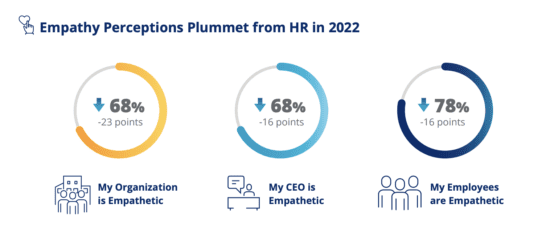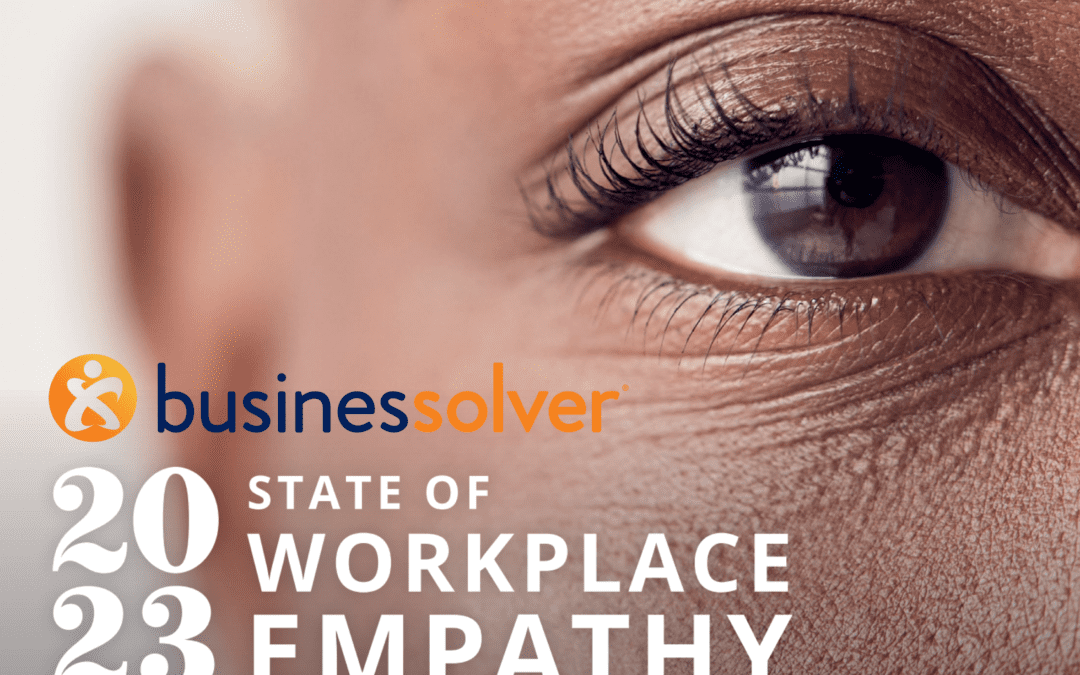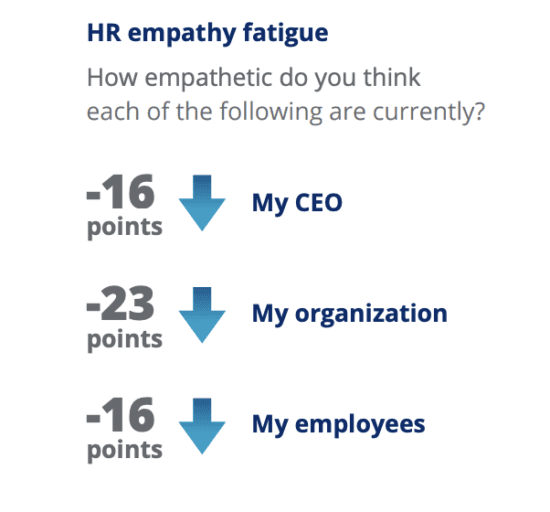A burgeoning empathy & mental health crisis
As I commented recently in The Dangers of Self-Actualization are Present, the rise in mental health issues — especially amongst the younger adults (18-24) — is disturbing. In the annual 2023 State of Workplace Empathy report by Businessolver, now in its 8th edition, it seems that there is simultaneously a crisis in empathy and mental health. In the report, they described the findings as “alarming” and with good cause. Business leaders are being forced to take some tough decisions in light of the clouded economic perspectives, challenging expectations in work conditions (notably with regard to flex/remote work) and protracted difficulties in filling vacancies. Businesses — and particularly those working in HR — are struggling to cope with these demands. Using an annual benchmark, this year’s report highlights an enormous gulf between how CEOs and HR professionals view one another. Specifically, 68% of HR professionals consider their CEO empathic, while 93% of CEOs consider their HR personnel as such. That’s a 24 percentage point difference and marks an inversion from the prior year. As Businessolver CEO, Jon Shanahan (a prior guest on my podcast), wrote in the covering memo, “What’s good for employees isn’t always what’s good for the viability of the company.” As a consequence, for HR professionals who are having to broker the challenging situations inside the workplace, 61% of them report that they have experienced a mental health issue in the past year (+9 points from 2022). The report suggests a correlation between empathy fatigure and burn out. I was struck how HR professionals scored the empathy of the company exactly the same as the score of their CEO (see below). For me, this validates a key point: the culture of a company is dictated by the top. And I note that employees evaluated the empathy of HR professionals at the very same level as the CEO, which suggests that the HR professionals are broadly viewed as extending the culture (and executing the demands) of the CEO.

Empathy as a weakness?
In the Businessolver’s 2022 study, they reported that 79% of CEOs say they struggle to be empathic and that 77% worry they will lose respect if they’re too empathic. If you think being empathic is a weakness, there’s no wonder you’ll find it difficult to be empathic (especially when you consider yourself the all-knowing and all-powerful boss). This misconception is fatal in many regards as it suggests that when CEOs are intending to be empathic, they’re basically manifesting a form of submissiveness or losing their backbone. Empathy is not about being weak. Nor for that matter is being vulnerable, another often misunderstood attitude. The nature of being vulnerable is to open pathways, showing your human-ness. By being vulnerable, you are letting someone in. You are showing you are not infallible. That you need others. In a world filled with narcissism, oversized egos and malaise, if not antipathy, showing vulnerability can take great courage. Being truly empathic requires an ability to wipe clean one’s own agenda and dedicate time and energy leaning into the life (or lives) of the other. It takes a certain generosity of spirit, which should never be taken as a sign of weakness.
Empathy as ‘doing good’ or ‘being nice’?
If empathy isn’t about being weak, nor is it necessarily about being nice or compassionate. Those qualities are choices made once empathy has been appropriately applied and you have gained a better understanding of the feelings, thoughts and experiences of the people to whom you’re addressing your message. Even when you have to deliver bad news, there are more and less empathic ways of doing so. Such empathy doesn’t change the fundamental content of the message, but it sure can help in a better reception. The actions that follow empathy are better informed for understanding the other person’s context. It’s true that once you understand the other person’s situation, you might better get their side of the story. Here, the decision for the boss is to make the soundest decisions in the interests of the long-term health of the company. One of the challenges for Human Resource professionals is figuring out the balance between the humanity in Human and the productivity in Resources. Similarly, when a business sets out a higher purpose, one cannot sacrifice everything for the sake of doing good. It’s as unsafe and improbable as trying to be perfect. If your business is insolvent, it serves no purpose. As Shanahan explained, not all business decisions are in the best interests of the employee. That’s why it’s very important for employees — and for HR professionals in particular — to understand the nature of the business they’re working for and what are the key strategic imperatives. Without these inputs lodged in the operation of the company, it’s easier to be swayed by the personal (that in some cases could be categorised as “sob”) stories of the staff. My modus operandi was to try to always be fair and firm across the board. When you show favoritism or uneven displays of judgment, you will open yourself up to any number of twisted issues.
Empathy: A two-way street?
Another aspect of the 2023 Businessolver report that stood out for me was the decline in empathy that HR professionals felt from their employees, down 16 points from the prior year. When we talk about empathy in business, for the most part, it’s about the empathy from the one(s) wielding the power. We don’t often think about empathy as necessarily being two-way. Surely, it is incumbent on the CEO and senior team to lead the way and exhibit the behavior they wish to see happen throughout the business. That’s how a company culture is created. However, far from making this a plea for the indulgence of poor leadership, I believe that employees who can show empathy for their stressed superiors will, ultimately, benefit as well. Given the turmoil and challenging business environment, I think it’s not unfair to say that employees have the choice of whether to believe they’re a part of the future of the company or a part of the problem. Insofar as many employees are disengaged at work, not feeling motivated, and possibly looking elsewhere for employment, there are certainly many leaders that need to change their ways. Yet, I also believe that self-motivated individuals with a strong compass and solid amount of empathy will quickly be picked out as leaders for tomorrow.
Please take a read of the Businessolver 2023 report, including their special report on mental health. I’m sure you’ll agree that it makes for a stimulating read.













Hi Minter,
You make so many great points in this article.
There is such a misunderstanding of showing empathy in business. And that to understand and have empathy does not always mean a decision goes in the favour of an employee’s needs if they would override the needs and safety of the business. This is the balance a leader has to get right.
I also loved the point of empathy being a two way street. I can tell you, the times when my employees have shown me empathy when the weight of running of business is sometimes pretty heavy has been so heartening and it’s made me more determined to run a safe, secure business for them to be proud to work for.
Cheers,
Lena x
Love your insights Lena about how, when employees know how to show empathy, it is something that the boss can truly appreciate!